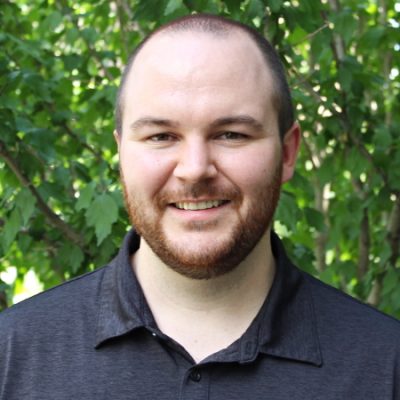Postdoc Spotlight: Andy Borum

October 5, 2020
Andy Borum is a postdoc in mathematics from High Point, North Carolina. He earned his undergraduate degree in engineering mechanics and mathematics at Virginia Tech, his doctorate at the University of Illinois at Urbana-Champaign in aerospace engineering, and now researches the mechanics of thin elastic objects for use in robotics work as a postdoc at Cornell. He is a recipient of a Postdoc Achievement Award as part of Cornell’s celebration of National Postdoc Appreciation Week 2020.
What is your area of emphasis? Why is this work important?
My goal is to understand the mechanics of thin elastic objects, such as flexible wires and deformable surfaces, and then use this understanding to derive methods for robots to manipulate these objects. Many of the tools I use to analyze elastic structures come from a field called optimal control theory. This work is important because as automation grows within the medical and manufacturing fields, there is an increased need for robots capable of interacting with deformable objects. Some examples include surgical robots that handle flexible equipment, such as suture, and manufacturing robots that install deformable components, such as flexible circuitry.
What inspired you to choose this field of study?
I love the mix of analytical, computational, and experimental work this field allows me to pursue. I spend about half of my time thinking about theoretical problems, and the other half is spent working with computational models. I also get to collaborate on experiments with experts from many fields, ranging from robotics to biology, so I’m always learning new things. Finally, I love how accessible many of the problems are, especially when they turn out to be mathematically challenging. Many of the interesting properties of thin elastic structures can be demonstrated with everyday items—my favorite is the Slinky!
What does receiving a Postdoc Achievement Award mean to you?
I’m very grateful for this award, and I’m thankful that my postdoc position gives me the freedom to pursue academic interests outside of my research. I hope this award will raise awareness about all of the opportunities for community engagement and outreach at Cornell.
What hobbies or activities do you enjoy in your spare time?
Outside of my personal research and on-campus teaching, I really enjoy collaborating with undergraduate students on research projects and working with the Cornell Prison Education Program. When I need to disconnect from work, I enjoy cooking (especially with all of the produce we get here in the fall) and reading. In the past few months, I’ve become fascinated with biographies of my favorite musicians.
Why did you choose Cornell?
Cornell has a strong history at the intersection of applied math and engineering mechanics, which is how I would describe my work, so I was excited to collaborate with many of Cornell’s experts in this area. I also love the mountains, so I couldn’t say no to Ithaca’s gorges and waterfalls.
What is next for you?
I’m looking for a faculty position that will allow me to pursue my academic interests, both within and outside of research. In addition to addressing fundamental questions in mechanics and robotics, I want to continue working with students impacted by incarceration and facilitating summer research programs for undergraduate students.
Do you have any advice for current graduate students?
I’ve learned so much (both within and outside of research) through collaborating with undergraduate students. I would definitely recommend seeking out opportunities to work with and mentor undergraduate researchers.
